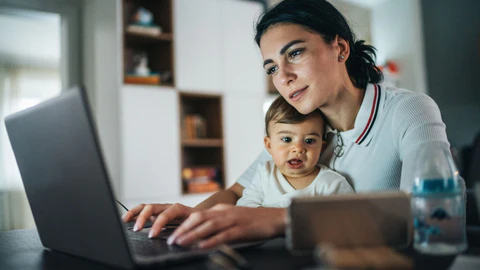
Dr. Giselle Tadros has been a licensed physical therapist since 2000, receiving her Doctorate of Physical Therapy in 2009 from The University of Medicine and Dentistry of New Jersey. She has taught at Columbia University in NYC and has worked in several different settings including the school system, Early Intervention, Out-Patient Pediatric and High Risk Clinics. She currently owns her own clinic, In Home Pediatric, in Martinsville, NJ and also provides physical therapy to infants and children in the comfort of their own homes. Follow her on IG here and here.
We caught up with the pediatric physical therapist to discuss what tell-tale signs to look for, how to find a PT, and what she loves most about the job.
What inspired you to become a pediatric physical therapist?
Kids and (especially) infants are such a fun population to work with! They are not only innocent, cuddly, and sweet, but their ability to learn, change, and improve rapidly is fascinating! I also love empowering and educating parents through this journey, so it seems to be a perfect match!
What are the most common pediatric issues you treat?
We focus on helping babies and toddlers who present issues such as Torticollis, Flat Head, muscle tension, tightness, tongue, and lip ties and/or Developmental Delays to improve movement and achieve developmental milestones to make everyday activities easier.
How much "homework" do you assign to your patients and their parents, and what might that entail?
This is a great question and one with which all physical therapists struggle. I have changed what I do through the years, but recently, I have found the greatest success in assigning 2-3 effective exercises /activities to parents. I generally have them record it with their phones during our sessions for easy access and recollection. Most ‘homework’ activities are fun and playful.
In your 2+ decades in practice, what has been the most rewarding / memorable experience or success story?
I know this sounds cliche, but I truly feel blessed to help so many babies and families. Everyday feels rewarding and memorable! Often, the most rewarding cases are those who, according to our clinical experience, will take a long course of therapy, but because of resilience, dedication, and compliance, they progress and achieve their goals rapidly! Perhaps my biggest success story is a little boy who I helped return to exclusive breastfeeding after 10 weeks of being bottle fed pumped milk. It was a true labor of love for all parties involved, and we are still friends today.
What are the tell-tale signs of lip and tongue ties?
-
nipple pain
-
lip blisters
-
Colic
-
Reflux
-
milk tongue
-
clicking sounds while nursing
-
chomping
-
neck tension
-
always hungry
-
a side preference
-
can’t hold pacifier
-
falls asleep after a few minutes
How can parents decipher if a baby/infant has a legitimate challenge that needs professional assistance or if it's something they'll simply "grow out of?”
Babies change rapidly. If there’s something you’re worried about for more than 4-6 weeks, it’s likely worth investigating. I truly believe that a mom’s superpower is her intuition: listen to your own intuition and instincts. Moms always have a way of hearing that little whisper in their heart and knowing something isn’t quite right with their child. It doesn’t matter if your doctor, or even your partner, doesn’t sense something is wrong. Listen to that voice inside and follow your instincts to find help.
What are your top tips for parents seeking a pediatric physical therapist with the perfect balance of experience and "baby whispering" prowess?
Do your research, check reviews, ask your community groups, and find a therapist who ONLY treats children and has great results. My personal philosophy on improving the well-being of patients is education is truly the key to prevention and avoiding issues later in life. I’m committed to bringing this message to help as many people as I can — because life is more than just my individual practice and the children I work with. There are so many others out there who need help.



